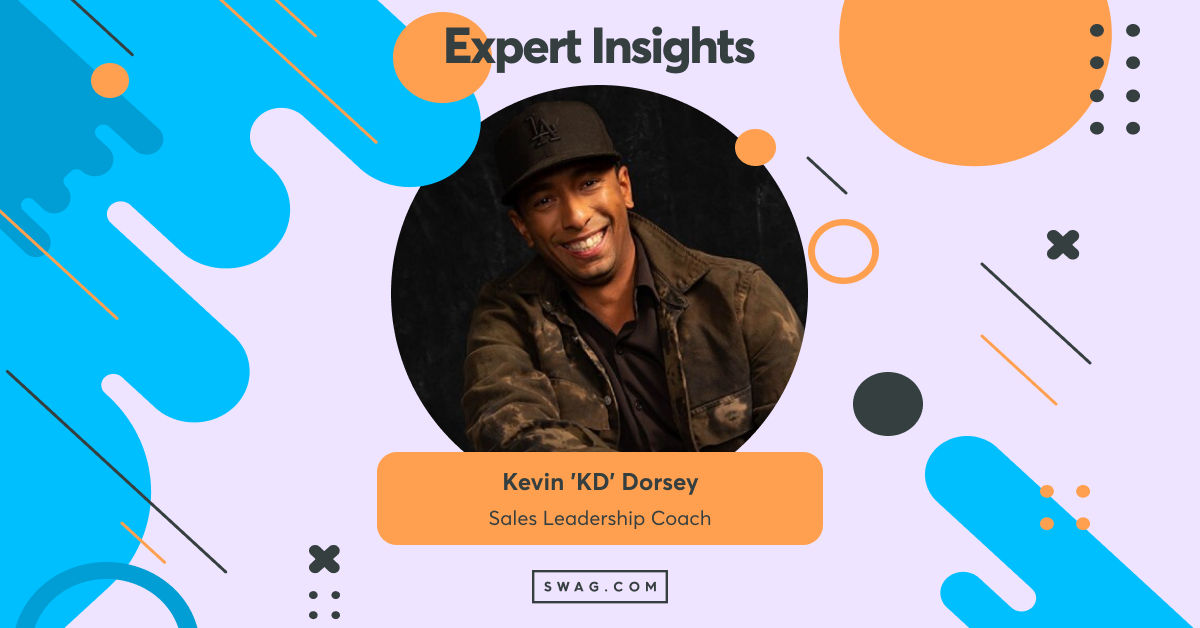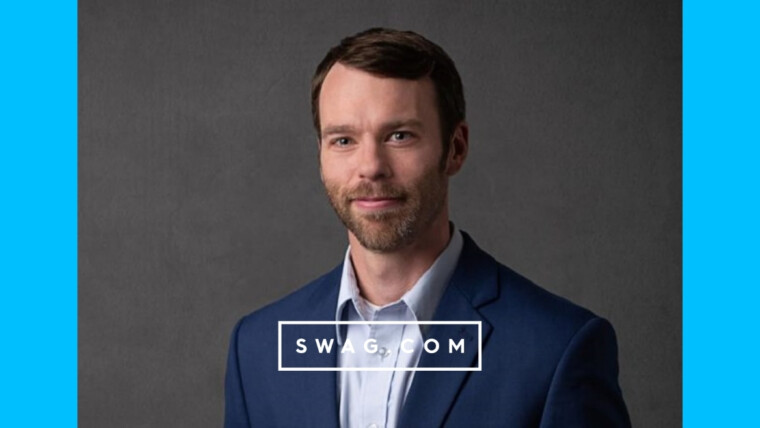Here at Swag.com, we get the chance to cross paths with tons of experts from the business world.
From thought leaders in HR, sales and company culture, to cutting edge creatives working in events, advertising and branding, we work with all sorts of talented individuals pushing the boundaries of how business gets done.
Our Expert Insights series aims to bring our audience tips, tricks and wisdom from top professionals across the globe.
KD is an expert in sales leadership and having recently passed 100,000 followers on LinkedIn, KD shares his insights with a large community of professionals from all backgrounds.
We spoke to KD about the power of understanding the person inside of the salesperson, how he has built his community and, of course, his thoughts on swag.

Swag.com: A fundamental pillar of your sales strategy and your idea of business relationships is the idea of focusing on the “person” in salesperson. What does that mean to you?
Kevin ”KD” Dorsey: At the end of the day, we are all people. And I think so often in marketing and sales, we forget that— we pitch to personas, and we forget that we’re dealing with people. People have emotions, people have egos, people have hopes, wants dreams, desires, fears, and all of that. When you actually address those things, the results we’re actually looking for tend to go up. When you hire salespeople, you hire them for who you want them to be. If you ask any sales leader out there what do you want your salespeople to be? They’ll say, you want them to be more confident, to be more disciplined, you want them to be more resilient, you want them to be more creative, you want them to be harder working, and all those are states of being. All everyone talks about is how— we don’t talk about who you need to be, we talk about what you need to do your job.
I firmly believe if I can address the person side, if I can help you be more confident, your sales get better. If I can help you be more resilient, your sales get better. If I can help you be a better listener, your sales get better. So I’ve shifted a lot of my focus to the being side, the person side.
That’s a good segue into your presence on LinkedIn. You recently passed 100,000 followers— congratulations! How did you do it? And do you see yourself as a type of content creator?
Again, I remember that I’m talking to people.This whole brand building thing just happened completely on accident— it was never the goal. I don’t even know that I like it that much, to be honest. Everyone’s trying to do it now, but it just happened for me over six, seven years. Everyone loves to ask me like how I did it. Very few people are asking why. And why I did it, again, came back to people. I wanted access to people smarter than me. I figured I could get access to people. And then I wanted people to want to work for me; but the right types of people. There are people that will like me, and there’s people that probably can’t stand me. That’s okay! I’m attracting the right type of people into my tribe, into my world, and into my teams. So very similarly, I write to people. I think about, who are the people that are going to read this? I also like remembering that people like to laugh. People like realness, people like authenticity. I’ve been called a lot of things in my career and a lot of things in my, call it brand building, experience. Fake has never been one of them. That’s something that I also think resonates with people. You can tell when someone’s being real versus whether they’re putting on a persona.
I think that’s how I look at it. At the end of the day, I’m a practitioner that makes content. I’m not a content producer. All of my content comes from what I actually do. Someone I worked with said probably the best compliment I’ve ever gotten in leadership. He said, “you’re not a guru, you’re a do-ru, because you actually do these things.” And that’s always stuck with me. I’m a practitioner that creates content. I’m not a content creator that tries to do the job. That’s also what resonates with people. It’s coming from a place of, I did this, I lived this. I’m speaking about things I’ve actually done, not just giving advice on what things should be done.
That makes sense. How do you judge which of your real life experiences are worth sharing with your audience then?
Again, it’s just interactions with people. There are three or four things that have happened already in this conversation that I can write something about, that I think people would identify with. Because again, think about people. We all have very similar experiences, right? You just pay attention to what happens when you’re engaging with people. Anything that y’all experience, other people do too. Y’all just might write about it, and they don’t. That’s all it is. I keep it on my notes app just all the time, these ideas. Oh, that was a good conversation— write it down. Oh, what are the questions I have as a person? I write them down. How do I feel as a person? Write it down. It just makes my life creating content so much easier. This is just life.
In one post you talk about being “too addicted to speed.” Could you talk about what the balance looks like between remaining professionally ambitious, and also taking time to make sure you’re not moving too fast?
When I think about it in my own life, it’s actually like slowing down to speed up. That’s how I always look at it. You can quickly do things wrong, or you can go a little bit slower and do it right. Everyone’s addicted to scale, they’re not addicted to success. Everyone wants to scale. No one’s talking about succeeding! It’s actually comical when you think about it. No one talks about how to succeed, they talk about how to scale. That’s broken! The only reason you want to scale is to succeed, right? Even the word ambition has nothing to do with speed. And the word ambition has nothing to do with speed. It has to do with passion, and determination, and hard work. It has nothing to do with speed. But people have confounded the two. They say to be ambitious, you have to rise quickly. No, you don’t. To scale— that has nothing to do with success. And that’s what we’re seeing happening right now with all these layoffs. They scaled, but they were not successful.
So you think changing the metrics we’re using to measure our efforts is important?
So actually, no. I guess it depends on what metrics we’re talking about, right? Funnily enough, speed is not a metric. Speed is a timeline, it’s an outcome— how quickly you accomplish something is not necessarily a metric. You can look at a sales cycle. That’s a speed metric. What’s interesting is that sales cycle doesn’t have nearly the impact on revenues people think it does. Sales cycle is when a deal comes in, not if a deal comes in. I’m okay with a 90 day yes, over a 70 day no. Sales cycle isn’t the problem. It’s just the longer deals go, close rates tend to come down. A lot of reps rush a deal for the cycle, and then negatively affect their close rates, whereas if they had worked it better and longer, they actually would have gotten the yes.
Metrics are important. This is sometimes where I think people expect me to go one way and say, oh, you know, it’s not about not about quantity, it’s about quality. No, it’s both. I don’t care how good of a closer you are. Say you have a 50%, close rate and you run one demo— do you get to your deals size? Do get your revenue? You don’t. 50% of one is point five, and you can’t close point five. You need a certain amount of quantity, with quality, to get there. Metrics are the foundation of that. You need to know your core metrics, know which one’s the biggest, and then focus there. But you need quantity and quality. You can’t ignore one for the other.
Another post you recently shared featured a conversation you had with someone who was struggling professionally, and maybe personally as well. Are there any tips you can give people about how to make changes in the way they’re viewing their work in order to be more authentic? Something people don’t think about, or something they are not prioritizing in the right way?
I think truthfully, most of us don’t succeed at what we’re trying to do simply because we don’t execute what we do know. We know what to do more often than not, we just don’t do it. That is, truthfully, the core of it for most people.
You saw it in the individual’s response back to me, right? My first question was, are you doing what you know you should? Because if you’re doing what you know you should and it’s not working, that’s a very different conversation then when you’re not even really doing what you know you should be doing. And so it starts there: are we executing on what we do know. If you ask most people what they need to do to be healthier, they would have a good list of answers for you. If you ask most people what they need to do to have a better relationship, they would have some answers for you. If you ask most people what they need to do to be more successful in their life, they’d have an answer for you. And then you ask them, “well, are you doing them?”
Now in order to execute, you do need to be taking care of yourself. Back to this idea of person, you are more likely to execute if you have more energy. You are more likely to execute if you are positive. You are more likely to execute if you are sleeping well. You are more likely to execute if you meditate. You are more likely to execute if you practice gratitude. You are more likely to execute if you enforce play in your life. You are more likely to execute if you strike out a strong social circle.
So there are these two sides to it. You have to execute. There’s no way around it. Unfortunately, in the past couple years, hustle is now bad, this idea of hustle culture. Hustling is not bad. It’s lack of balance that is bad. There’s nothing wrong with hustling. It takes hustle to succeed at these things. It’s the lack of balance that most people do. It’s the hustle without the care that f*cks it all up. But in order to hustle you need to take care of yourself.
You have another post on LinkedIn about creative strategies to close deals and win new business. Could you talk about any examples of creative gifting solutions to this problem? How can people use custom gifts to win new business?
I’ve been a huge direct mail person, literally for ten or eleven years. I was packing my own boxes at my first sales job, and learning how to write sales letters. I’ve always been a big believer in, call it tangible channel selling. I’ve always been a big believer in it. I’ve done all sorts of different things. But I think most people get tangible selling wrong, because, and this is not a knock to y’all, they send swag.They send you know, a Kevin Dorsey mug to you. They send Inside Sales socks to you. They’re sending swag. I don’t believe that’s the right method. I don’t want your swag. That’s not something that I want. That’s not something that I’ve requested.
When I do direct mail, I’m doing things based on what I believe they would want. What would they use on a regular basis?
When I joined Patient Pop, we were sending Patient Pop mugs, and Patient Pop squishies, and whatever. I scrapped all of that, because we were selling to doctors. We started sending mugs that said, “Don’t confuse your Google search with my medical degree.” You think the doctors liked that a little bit more? We started sending a coffee mug and a wine tumbler, and one said “before patients” and one said “after patients.” That’s when people respond back and go, “Ok, that was pretty clever—you got me. What is it y’all do?” Think about, what would my prospect actually want? What would they show somebody else? What would make them smile. Right?
I’ve got a tumbler right now with the brand of some company on it. I have no positive association to it. But if this had said something like, “my title is VP of sales because Miracle Worker wasn’t allowed,” I’d be showing that to people. It’s those types of things that you want to think about, and that’s where I think humor can be so valuable. I don’t want your socks. But if it was something that a VP of sales would care about, laugh about, think is funny— that would get me. That’s something that shows I get your world; I understand what’s happening. It actually establishes credibility. Whereas if you just send me some socks, did you even try? That, to me, is lazy swag. And I don’t like that.
What is the best piece of swag you’ve ever received?
Ooh, boy, the best piece of swag… Real quick. Are we talking about swag? Are we talking like a personalized gift?
We could go with either.
One of the better personalized gifts I got was a decanter that says “pipeline over everything,” which is one of my taglines. It has a buffalo on it, because the buffalo was my favorite animal and I talked about it on a podcast. The buffalo is my favorite animal because they run through storms, not away from storms.
What’s the worst piece of swag you’ve received? Something in particular, or a trend you just don’t like.
The things that frustrate me are just the things that I think are lazy. When you send me socks with your logo, you send me a coffee mug with your logo… I don’t get angry, it doesn’t piss me off. It’s just lazy. It’s almost like a disappointment more than it is anything else. That was the shot you were gonna shoot? You sent me some socks with your logo on it? And while we’re talking about it, most of them send out cheap, not even comfortable socks. So they’re ugly, with your logo, and they’re not even comfortable. Those are the ones that I look at and go, that’s just lazy. And I don’t respect lazy. I have zero respect for lazy.
Are you an industry leader that would like to be featured on our blog? Please feel free to reach out to blog@swag.com to get in touch.











